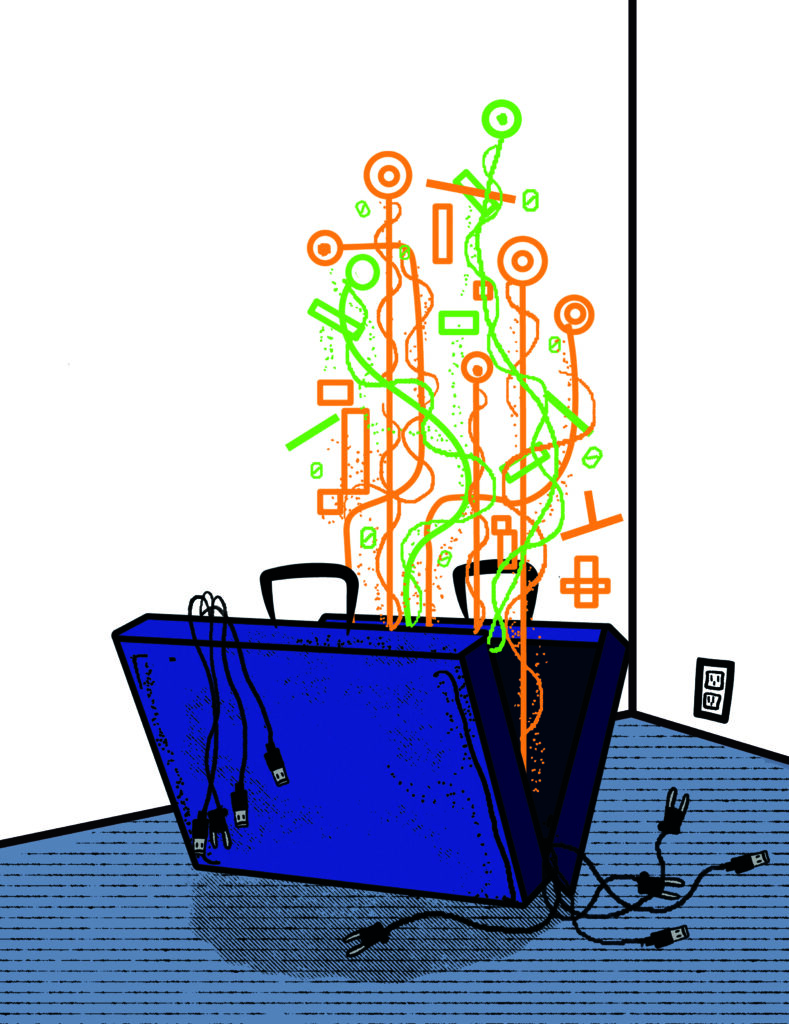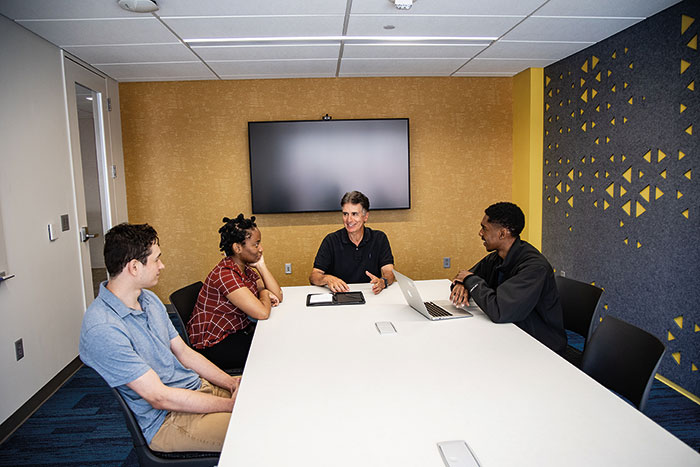Summer Tech-Edge program opens doors for liberal arts students
 By Eliott Grover
By Eliott Grover
Illustration By Evan Field
Photos by Ginny Kemp
The CEO of YouTube majored in history and literature, and the CEO of Nike was an economics major, as was the CEO of PayPal. Slack, a company that has revolutionized day-to-day business operations, was founded by a philosophy major.
The fact that some of the most innovative minds working at the crossroads of business and technology hail from a liberal arts background speaks to the versatility such an education provides.
“I’ve been an IT executive for the majority of my career, and I’ve seen the value that liberal arts students can bring to the technology field,” says Steven Gomes ’83. “They bring a critical-thinking aspect to the job as well as the ability to collaborate and use diverse opinions to find creative solutions for business problems.”
Yet the idea persists in some circles that a liberal arts background leaves a student less prepared for a career in business than a STEM education, and this theory creates unique challenges for liberal arts students entering today’s job market, says Joseph Catrino, executive director of Trinity’s Career and Life Design Center.
Gomes adds, “Right now, a lot of companies use AI and other technologies to screen résumés. This means that as a liberal arts student, the chances of getting screened out are higher due to the lack of tech experience on your résumé. Tech-Edge closes that gap.”

Tech-Edge, an intensive three-week summer program run out of Trinity’s Innovation Center at Constitution Plaza in downtown Hartford, helps liberal arts students gain technology experience. Developed as part of the Trinity-Infosys Applied Learning Initiative, the collaborative effort aims to bridge the gap between the liberal arts and the future of digital technology.
“What’s valuable about it is that students get introduced to technology concepts alongside business concepts,” says Gomes, who has served as the program lead since its inception in 2019. “Personally, the reason I got involved is because I think it’s something that will really benefit students as they move forward in their careers. It opens opportunities for them.”
Psychology major Kaila Dowd ’25 participated in the Tech-Edge program following her first year at Trinity. She was interested in taking a computer science class as a sophomore and after hearing about Tech-Edge thought the program could give her a head start.
“I was drawn to it for that academic aspect,” she says, “but it ended up being a lot more valuable. I learned about all the ways business is connected to technology, and it opened my eyes to all of the different career opportunities we have regardless of our major.”
Tech-Edge has three components. An academic portion introduces students to concepts such as coding, cybersecurity, and blockchain technology. A business innovation segment exposes students to industry professionals, often alumni, who demonstrate how the concepts students are learning can be applied in real-world situations. Finally, an emphasis on career enhancement helps students position themselves for future success.

For the academic program, students can opt to receive credit for their coursework. The curriculum is rigorous but accessible, according to Associate Professor of Computer Science Ewa Syta, who serves as Tech-Edge’s academic director. Syta notes that tech tends to be intimidating for students without a STEM background. “We want to break those barriers,” she says. “But I never want to convey the idea that the liberal arts is not enough. I tell all the students on day one that I have zero plans to turn them into a STEM major. Instead, I want them to gain a valuable skill set to complement their knowledge and interests and to open up opportunities.”
Syta, who earned a Ph.D. in computer science from Yale University, is a firm believer in the union of liberal arts and technology. “I want students to learn that tech is a key enabler for innovation,” says Syta, who also serves as chair of Trinity’s Computer Science Department. “It’s a powerful tool that can be used to offer solutions, but it will not solve real-world problems by itself. We want to produce creative students who can harness tech to solve these problems. We don’t need them to be tech experts, but they should be tech literate.”
The business innovation aspect of Tech-Edge shows students how they can apply their newfound conceptual knowledge. Alumni including Lou Shipley ’85, a Trinity trustee, and Daniel Krook ’00 have been instrumental in sharing their experiences during interactive sessions. Shipley, an entrepreneur and former tech CEO who majored in economics at Trinity before earning an M.B.A. from Harvard Business School (HBS), currently serves as a lecturer at HBS and MIT’s Sloan School of Management. Krook, who majored in political science and international studies, is a principal cloud architect at IBM, where he has played a leading role in running Call for Code, a global initiative that inspires developers to create sustainable open-source software solutions for the world’s most pressing problems.

“The industry speakers show how understanding and utilizing a small amount of tech can open doors in a number of different ways,” Syta says. “There are so many different roles—project managers, UX designers, testers. They’re not necessarily computer science people by trade, but they’ve learned how to successfully leverage a relatively small amount of tech alongside their other strengths.”
The culmination of Tech-Edge is a two-day challenge where students work in small groups to solve a real-world problem. Last summer’s prompt focused on sustainability and elicited a number of creative ideas. One group proposed a campuswide rideshare program to capitalize on the shared migratory patterns of school life. Another developed a virtual reality tour of a nuclear power plant that could be used to educate citizens who are voting on whether to build such a facility in their town.
“Their idea was based on this belief, which I agree with, that once you have firsthand experience with something, you’re much more willing to give it more thought and change your beliefs,” says Syta. “They designed it in a way that you could take the technology and apply it to any other societal problem or something you’d like to educate people on.”

Starting in 2022, Tech-Edge participants had the option to participate in an eight-week internship following the program. “We use our tremendously valuable alumni network and other key partners around Hartford to line up these opportunities,” says Catrino. Tech-Edge students interned at Aetna, Infosys, and various departments within Trinity.
Dowd worked with Trinity College’s Office of Information Security, where she improved web content for students and faculty. “Anyone who went into the program wanting an internship came out of the program with an internship,” she says.
In a world where some employers use artificial intelligence to screen résumés, a process that Gomes says can negatively affect liberal arts students, this kind of experience is invaluable.
“Think about this,” Catrino says. “You’ve just finished your first year, and you’ve been accepted into Tech-Edge. You’re going to gain all these tech skills, and then we’re going to get you an internship. Think about the investment you’re making in your future. I look at it as scaling and stackable. The students who completed Tech-Edge got an internship that same summer. What’s next summer going to look like for them? I think it’s going to look even better.”
For more information on Tech-Edge—which is designed for undergraduates and recent graduates from Trinity or from other institutions—please visit https://www.trincoll.edu/tech-edge/.